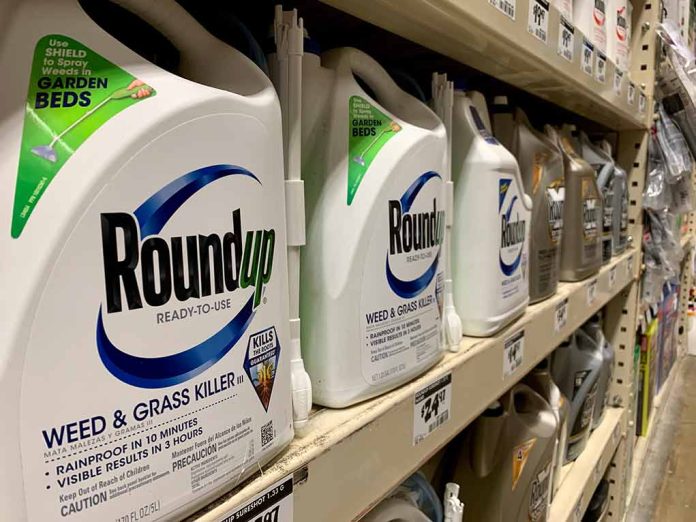
A Georgia jury has delivered a crushing $2.1 billion verdict against Bayer in a Roundup cancer lawsuit, marking another major defeat for the company that continues to insist its weedkiller is safe despite mounting legal challenges.
Key Takeaways
- Georgia jury awarded $2.1 billion to John Barnes, finding Bayer’s Roundup weedkiller caused his non-Hodgkin’s lymphoma
- The verdict includes $65 million in compensatory damages and $2 billion in punitive damages
- Bayer plans to appeal, claiming scientific evidence and regulatory consensus support Roundup’s safety
- Over 165,000 Roundup lawsuits have been filed, with more than 54,000 still pending
- Conflicting assessments exist: the International Agency for Research on Cancer classifies glyphosate as a probable carcinogen, while the EPA considers it unlikely to cause cancer
Record-Breaking Verdict Adds to Bayer’s Legal Troubles
A Georgia jury has ordered Bayer to pay approximately $2.1 billion to John Barnes after finding that the company’s Roundup weedkiller caused his non-Hodgkin’s lymphoma. The massive award includes $65 million in compensatory damages and $2 billion in punitive damages, making it one of the largest verdicts yet in the ongoing litigation over the popular herbicide. Barnes’ attorney, Kyle Findley, described the ruling as an “important milestone” in the legal battle that first began in 2021.
This latest verdict represents another significant setback for Bayer, which acquired Roundup manufacturer Monsanto in 2018 for $63 billion. The company has already paid approximately $10 billion to settle similar claims and has set aside an additional $5.9 billion for over 60,000 pending cases. Despite these settlements, thousands of lawsuits remain active in courts across the United States.
Scientific Controversy Continues to Fuel Litigation
At the heart of the Roundup litigation is an ongoing scientific debate about the safety of glyphosate, the active ingredient in the weedkiller. In 2015, the International Agency for Research on Cancer (IARC) classified glyphosate as “probably carcinogenic to humans.” This classification has been cited repeatedly in lawsuits against Bayer. However, regulatory bodies like the Environmental Protection Agency (EPA) have reached different conclusions, with the EPA maintaining that glyphosate is unlikely to be a human carcinogen when used according to label directions.
Barnes’ lawsuit accused Bayer of ignoring scientific studies on Roundup’s toxicity and denying its connection to non-Hodgkin’s lymphoma. The plaintiff’s legal team presented evidence suggesting that Monsanto had downplayed potential health risks associated with the product for years before Bayer acquired the company. In contrast, Bayer’s defense has consistently pointed to decades of scientific research and regulatory assessments that they claim support Roundup’s safety.
Bayer Vows to Appeal as Legal Battles Continue
Following the verdict, Bayer immediately announced plans to appeal, expressing strong disagreement with the jury’s decision. The company maintains that the verdict conflicts with extensive scientific evidence and regulatory consensus supporting Roundup’s safety. Bayer has noted that in previous cases, damages in final judgments have typically been reduced by approximately 90% compared to original jury awards.
According to Bayer, “We believe that we have strong arguments on appeal to get this verdict overturned and the excessive and unconstitutional damage awards eliminated or reduced.”
This Georgia verdict follows other significant legal defeats for Bayer, including a $75 million punitive damages verdict in Philadelphia in October 2024. The company has faced multiple jury losses with substantial verdicts against them, including a $2.055 billion verdict in Pilliod et al. v. Monsanto (later reduced) and a $289.2 million verdict in Johnson v. Monsanto. The legal firm Wisner Baum, which has been involved in several major Roundup cases, helped negotiate $10.9 billion in settlements that resolved approximately 60% of cases.
Regulatory Challenges and Future Implications
The legal landscape surrounding Roundup has been further complicated by evolving regulatory positions. In 2022, the Ninth Circuit Court of Appeals challenged the EPA’s conclusion on glyphosate’s safety, noting that “most studies EPA examined indicated that human exposure to glyphosate is associated with an at least somewhat increased risk of developing NHL.” This ruling has bolstered plaintiffs’ arguments in subsequent cases and raised questions about the adequacy of existing regulatory protections.
Facing mounting legal pressure, Bayer has been actively lobbying for legislative protection against future Roundup lawsuits. The company continues to sell Roundup products containing glyphosate in the United States, though it has announced plans to reformulate Roundup for residential use with different active ingredients. For agricultural users, who represent the majority of Roundup customers, glyphosate-based formulations remain available as Bayer continues to defend the product’s safety profile.
Sources:
- https://www.wisnerbaum.com/toxic-tort-law/monsanto-roundup-lawsuit/
- https://www.reuters.com/business/healthcare-pharmaceuticals/bayer-hit-with-2-bln-roundup-verdict-us-state-georgia-cancer-case-2025-03-22/
- https://m.economictimes.com/news/international/business/us-state-orders-bayer-to-pay-2-billion-in-roundup-cancer-case/articleshow/119350109.cms
- https://www.theepochtimes.com/business/bayer-ordered-to-pay-2-billion-by-georgia-jury-in-roundup-cancer-case-5830294



